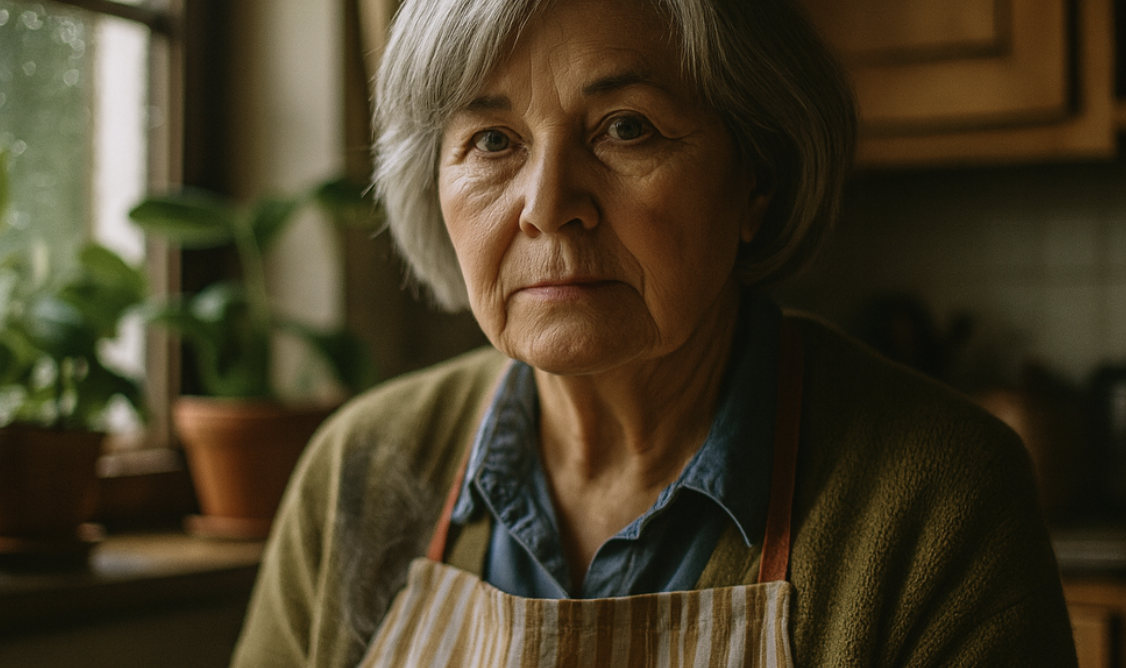Alina set the heavy bag on the floor and reached for the lock. Three months at the dacha had flown by unnoticed. Now it was time to return to city life, to work, to her usual routines.
The key turned easily. Too easily.
“Strange,” she muttered. “I’m sure I locked it twice.”
The door swung open, and Alina froze. Strange coats hung in the hallway. Unfamiliar slippers stood on the floor. From the kitchen came the smell of fried potatoes and the voice of the morning news anchor.
“What is going on?” Alina stepped inside and looked around.
Her tidy entryway had turned into a storage room. Bags, boxes, and sacks of medicine were scattered everywhere. The coat rack sagged under dresses and cardigans that weren’t hers.
“Alinochka!” Vera Sergeyevna floated out of the kitchen in a housecoat. “I thought you’d be at the dacha for another week!”
Alina blinked several times. No, she wasn’t seeing things. Her ex-mother-in-law stood in the middle of her apartment with a ladle in her hand, smiling as if greeting an honored guest.
“Ve… Vera Sergeyevna?” Her voice shook. “What are you doing here?”
“Frying potatoes. Are you going to eat?” The old woman turned back to the stove. “I’m making them with mushrooms—comes out delicious.”
“No, I don’t mean the potatoes!” Alina drew a deep breath. “What are you doing here? In my apartment?”
“Ah, that…” Vera Sergeyevna hesitated. “How to put it… Pavlik started renovations. Such dust, such noise! With my blood pressure I absolutely can’t. The doctor strictly forbade it.”
Alina walked into the living room. Her favorite armchair stood by the window. On the coffee table sat someone else’s medicines, glasses, and a stack of magazines. The sofa was covered with a throw she had never seen before.
“Hold on,” she turned to the older woman. “How long have you been living here?”
“Well… a week has gone by. Maybe two.” Vera Sergeyevna faltered. “Time flies so fast, I didn’t even notice.”
“Two weeks?” Alina’s voice rose. “You’ve been living in my apartment for two weeks?”
“Alinochka, don’t raise your voice like that. The neighbors will hear.” The old woman pulled the kitchen door almost shut. “I thought you wouldn’t mind. The apartment was standing empty.”
“Wouldn’t mind?” Alina felt herself starting to shake. “It didn’t occur to you to ask permission?”
“Well, I’m not a stranger!” Vera Sergeyevna threw up her hands. “We were family for fifteen years. Surely now, because of this divorce…”
“Precisely because of the divorce!” Alina took a step toward her. “We aren’t relatives anymore. This is my apartment—my home!”
“Good Lord, how hard you’ve become.” Tears crept into Vera Sergeyevna’s voice. “Throwing an old woman out on the street. Where am I supposed to go?”
“To your son! Go to your son!”
“But he’s renovating! I’m telling you!” She pulled out a handkerchief and dabbed her eyes. “That cursed dust… The doctor said any stress could end in a heart attack.”
Alina sat on the sofa and pressed her face into her hands. What a story. She had come home, and there was no home. Instead there was a strange old woman with her pills and her fried potatoes.
“And how did you get in?” she asked dully.
“I still had a key.” Vera Sergeyevna gave a guilty smile. “From back when Pavlik lived here. I forgot to give it back after the divorce.”
“I see.” Alina stood up. “In that case, pack up and leave.”
“Alinochka!” The old woman grabbed her sleeve. “Where am I supposed to go right now? It’s already evening. And I have so many things. And my heart acts up.”
“Not my problem.”
“All right, all right.” Vera Sergeyevna nodded. “Tomorrow morning I’ll start packing. Don’t worry.”
Alina looked at her closely. There was something insincere in that sudden meekness.
“Tomorrow?” she repeated.
“Well yes. There’s a lot of stuff; I can’t do it in an hour.” The ex-mother-in-law smiled again. “For now, let’s have dinner. The potatoes are ready.”
In the morning Alina woke to sounds in the kitchen. Vera Sergeyevna was clattering pots and humming to herself.
“Good morning!” the older woman called from the kitchen. “I’m making porridge! Oatmeal—very healthy!”
Alina threw on a robe and went out. The kitchen was a complete mess. Vera Sergeyevna bustled about as if she’d lived there all her life.
“Where are my cups?” Alina asked.
“I put them away in the cabinet. I put out my own—easier for me.” The old woman stirred the pot. “They’ve got special handles, for arthritis.”
“This is my kitchen!” Alina’s voice broke. “My cups, my cabinet!”
“Alinochka, why are you like this?” Vera Sergeyevna shook her head sadly. “I’m not here forever. A week more, two at most.”
“Yesterday you said you were leaving tomorrow!”
“I didn’t think it through… Pavlik called—says the renovation is delayed. The workers aren’t careful.”
Alina sat at the table and buried herself in her phone. She dialed her ex-husband.
“Pash, hello?”
“Oh, hey.” Pavel’s voice sounded sleepy. “How’s the dacha?”
“I’m home already. Listen, your mother is living here. In my apartment.”
“Uh-huh, she mentioned something.” He yawned. “I’ve got renovations; she can’t be at my place.”
“Pash, this is my apartment. Mine!”
“So what? She’s not bothering anyone.”
“How is she not bothering me? She’s rearranged everything and taken over the place!”
“Alin, just put up with it for a bit. Where else is she supposed to go?” Irritation crept into his voice. “She’s an old woman.”
“Not my problem! Let her go to you!”
“I told you—I’ve got renovations. Dust, noise. She can’t be there.”
“But I can, right?”
“You’re young and healthy. You’ll manage.”
Alina hung up and slammed the phone onto the table.
“What, did the little son not help?” Vera Sergeyevna clicked her tongue sympathetically. “Men are like that… They’ve got their own problems.”
“Get out.”
“Alinochka, be human!” The old woman sat down beside her. “I’m not in anyone’s way. I cook, I tidy up. I even scrubbed your tub.”
“I didn’t ask you to!”
“And I bought fresh groceries for the fridge. And watered your flowers. They were about to wither away.”
Alina stood and went to the bedroom. She slammed the door and leaned her back against it. What kind of nightmare was this? She’d come home, and a stranger was in charge.
An hour later the doorbell rang.
“It’s for you, probably,” Vera Sergeyevna called out.
Alina opened the door. Two elderly ladies stood there with a cake.
“Hello, dear!” chirped one. “We’re here to see Vera Sergeyevna. Is she home?”
“How is she ‘home’?” Alina was taken aback.
“Well, she lives here now,” the second woman smiled. “She said her niece took her in.”
“What niece?”
“Girls, come in!” Vera Sergeyevna squeezed past Alina. “Why are you standing in the doorway? I’ve already put on the samovar.”
The old ladies walked into the apartment. Tea, laughter, and chatter began. Alina locked herself in the bedroom and listened to them discussing her life through the wall.
“And where’s the niece’s husband?” one asked.
“She’s divorced. Got a bad one, a drinker.”
“Oh, I didn’t know!”
“What’s there to know… Young people split up so easily now. And we old ones have nowhere to live.”
Alina clenched her fists. A drinker? Pavel had never drunk anything stronger than beer! And now she was a niece, apparently!
By evening the guests left. Vera Sergeyevna washed the dishes and hummed.
“My friends are such good souls,” she told Alina. “They’ll come again tomorrow. Klava’s granddaughter is getting married—we need to discuss it.”
“No one else is coming,” Alina said through her teeth.
“Why not?”
“Because tomorrow you’re moving out.”
“Alinochka, I can’t yet…” The older woman flapped her wet hands. “My heart hurts, my pressure jumps. The doctor prescribed rest.”
“Not my problem.”
“You’ve become cruel. Heartless.”
Alina went to her room and took out her laptop. She started looking up lawyers’ numbers.
A week passed in a nightmare. Vera Sergeyevna settled in completely. She brought three more boxes of things, rearranged all the living-room furniture, and hung her photographs on the walls.
“It’s cozier now, isn’t it?” she asked when Alina came home from work.
“Where’s my sofa?”
“I moved it to the window. It’s brighter there—better for the eyes.” The ex-mother-in-law nodded with satisfaction. “And I turned the TV. Now you can see it from the kitchen.”
Alina walked silently to the bedroom. A note lay on the bed: “Dear, I took your vacuum home to clean it. Mine broke. I’ll return it tomorrow. —Vera.”
“What do you mean ‘home’?” Alina shouted. “Is this your home or what?”
“Well, I live here now!” came the reply from the kitchen. “I’m living here temporarily!”
Alina grabbed her phone and dialed Pavel again.
“Listen carefully,” she said the moment he picked up. “You take your mother away tomorrow.”
“Alin, don’t start again…”
“I went to a lawyer!” Her voice cracked into a scream. “This is unlawful occupation! Self-help!”
“Are you out of your mind?” Pavel snapped. “You want to throw my mother out on the street?”
“I do! That’s exactly what I want!”
“Then deal with it yourself. I don’t have time.”
He hung up. Alina hurled the phone against the wall.
“What’s all that noise?” Vera Sergeyevna peeked in. “Are you feeling sick?”
“I’m going insane!” Alina sat down on the bed. “You’re driving me crazy!”
“Alinochka, why are you so nervous?” The old woman perched beside her. “I’m a good tenant. I pay the utilities, I buy the groceries.”
“I don’t want tenants! This is my home!”
“But it’s a big apartment—there’s room for everyone. And it’s more cheerful together.”
“I am not cheerful!”
In the morning Alina got up early. She took the apartment documents, her passport, and the divorce certificate from the closet. She went to see a lawyer.
“It’s an unpleasant situation,” the middle-aged man shook his head. “But it can be resolved. File a report with the police.”
“And then what?”
“The local officer will come and write it up. If that doesn’t help—file a lawsuit.”
“How long will that take?”
“A month or two at minimum.”
Alina imagined two more months with Vera Sergeyevna and her friends. No, she wouldn’t survive it.
That evening she came home angry as the devil. Music was playing in the apartment, and laughter drifted out. Four old ladies sat in the kitchen playing dominoes.
“Alinochka!” Vera Sergeyevna waved. “Meet my girls. We decided to have a tournament.”
“What tournament?”
“Dominoes! We’ll get together every evening. You don’t mind, do you?”
“I mind very much!” Alina marched to the table. “Everyone out. Now.”
“Oh, how high-strung,” one of the old ladies whispered.
“She’s under stress at work,” Vera Sergeyevna explained. “All the young people are nervous nowadays.”
“Out!” Alina shouted. “All of you—out of my apartment!”
The guests scrambled to their feet, gathered the dominoes, and muttered something about ill manners. Vera Sergeyevna saw them to the door, apologizing and promising tea with cake tomorrow.
“Why did you offend them?” she asked when she came back to the kitchen. “They’re good, educated women.”
“Because this is my home!” Alina slammed her fist on the table. “Mine!”
“Ours now,” the older woman corrected calmly. “I registered here.”
“How did you register?”
“I went to the passport office. Got a certificate of temporary registration.” She pulled a paper from her purse. “Here, look.”
Alina snatched the document. Sure enough—stamp, signature, everything in order.
“How dare you?” Her voice shook.
“What’s the big deal? I brought the papers and said my niece allowed me to stay.”
“I am not your niece! And I did not allow it!”
“Well, the passport office ladies don’t know that,” Vera Sergeyevna smiled. “They’re kind, they take pity on the elderly.”
Alina sank into a chair. Her hands were trembling. That was different. Registration was serious.
“Tomorrow I’m filing a police report,” she said quietly.
“Go ahead,” the old woman nodded indifferently. “Only I’m old and ill. Who’ll believe I forced my way in?”
At dawn Alina got up at five. She dressed, grabbed her documents, and went to the police station. The local officer listened in silence and shook his head.
“It’s complicated,” he said. “But illegal occupancy is illegal occupancy. Let’s go sort it out.”
They arrived around seven-thirty. Vera Sergeyevna opened the door in her housecoat, sleepy.
“Oh my, what happened?” She looked nervously at the officer.
“Good morning. Senior Lieutenant Petrov. May we come in?”
“Of course, of course,” the old woman fussed. “I just don’t understand…”
“When did you move into this apartment?” The officer pulled out a notebook.
“Well… a month ago. Maybe a little more.” She sat on the sofa. “My heart is weak, my pressure…”
“Do you have a lease agreement? The owner’s permission?”
“What agreement?” She looked bewildered. “She’s my relative. Alinochka. She allowed it herself.”
“That’s not true!” Alina stepped forward. “I never allowed anything!”
“How could you not?” Vera Sergeyevna threw up her hands. “Then where did I get the keys?”
“You stole them! You never gave them back after the divorce!”
The officer took notes, nodding. Then he closed the notebook.
“Ma’am,” he addressed Vera Sergeyevna. “You need to vacate the apartment within twenty-four hours.”
“Vacate? Where am I supposed to go?” She clutched at her heart.
“That’s not our concern. You have a son and your own apartment.”
“But it’s under renovation! Dust! I can’t be there!”
“Then rent a place,” the officer said, rising. “I’ll come back tomorrow to check. If you’re still here, I’ll file a report.”
He left. Vera Sergeyevna sat on the sofa and burst into tears.
“Alinochka, how can you do this?” she sobbed. “I’m not a stranger. We lived together so many years.”
“Not together,” Alina said coldly. “I lived with your son. Never with you.”
“But I’m old! I’m ill!”
“Not my problem.”
Alina went to work. All day she wondered whether she’d come home to an empty apartment—or whether Vera Sergeyevna would decide not to leave and drag things out.
But when she opened the door that evening, the apartment was empty. The furniture stood where it belonged. The foreign things had vanished. On the kitchen table lay a note: “I took only what’s mine. The keys are in the cupboard. I didn’t think you were so cruel. —Vera.”
Alina crumpled the note and threw it in the trash. She walked through the rooms, checking that everything was in place. The bathroom smelled of someone else’s soap. The kitchen showed traces of furniture being moved. But the apartment was hers. Only hers.
She sat in her favorite armchair and pulled out her phone. Pavel had called five times and sent messages: “Mom is crying,” “You’ve gone feral,” “How can you not be ashamed.”
Alina deleted them all without reading. She blocked his number.
Then she went to the hardware store. She bought paint, brushes, and rollers. Tomorrow was Saturday—she could start renovating.
For two weeks she painted the walls, changed the wallpaper, and bought new curtains. She worked evenings and weekends like a woman possessed. She wanted to erase every trace of someone else’s presence.
When the work was finished, the apartment looked completely different. Nothing reminded her of that nightmare.
That evening Alina sat on her new sofa with a cup of tea. Rain fell outside the window. The apartment was quiet, cozy, and calm. No one was running the kitchen, no one was rearranging the furniture, no one was bringing guests.
She took her phone and wrote to a friend: “Masha, come over. I’ll show you the new interior.”
The reply came at once: “On my way! Should I bring a drink?”
“Bring one. We’ll celebrate.”
“What are we celebrating?”
Alina thought for a moment and typed: “Freedom.”
She set the cup on the coffee table and smiled. For the first time in a long while—truly, from the heart. The home was hers. The life was hers. And only she would decide what to do with them.



